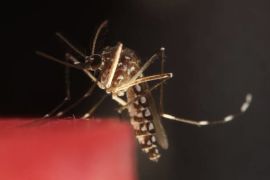"This is a zoonotic disease, and when we look at the speed at which it infects people, so far, there is only one case reported," Tarmizi noted in a statement received here on Tuesday.
She remarked that the disease is contracted from bites or scars inflicted by animals and not from human to human, so the disease would not spread as quickly.
However, Tarmizi affirmed that the ministry continued to remind the public to stay cautious, especially those spending their vacations in Hong Kong, China, or areas where the cases are reported.
"Spread from human to human in nearly nonexistent, (and the likelihood) is so low. Thus, avoid monkeys, do not feed them, and should there be any wounds from bites or scratches, immediately clean it with flowing water and soap," she explained.
People are also urged to rush to health facilities immediately after the attack, so they can receive proper treatment, she noted.
Related news: Indonesia boosts virus sequencing capacity amid endemic transition
Recently, mass media outlets reported that sometime in late February, a 37-year-old man was attacked and wounded by monkeys in Kam Shan Country Park, Hong Kong.
According to the Hong Kong government website, weeks after the incident, the man —who was usually in good health condition— suddenly fell ill, and he was rushed to Yan Chai Hospital on March 21. Currently, the man is in critical condition and is undergoing intensive care.
Hong Kong's Center for Health Protection on Wednesday, April 3, found that the man's cerebrospinal fluid specimen had tested positive for B virus.
According to Centers for Disease Control and Prevention (CDC), B virus infection is very rare, but it can lead to brain damages, even death, if left unchecked.
One can contract the disease if scratched or bitten by an infected macaque monkey or having come in contact with the monkey's eyes, nose, or mouth.
The symptoms of the virus are similar to flu, such as fever, muscle ache, fatigue, and headache. Symptoms usually appear a month after contact with an infected monkey, though they can arise as early as three to seven days.
Related news: BRIN develops virus-like particle to make vaccines
Reporter: Mecca Yumna Ning Prisie
Editor: Yuni Arisandy Sinaga
Copyright © ANTARA 2024












